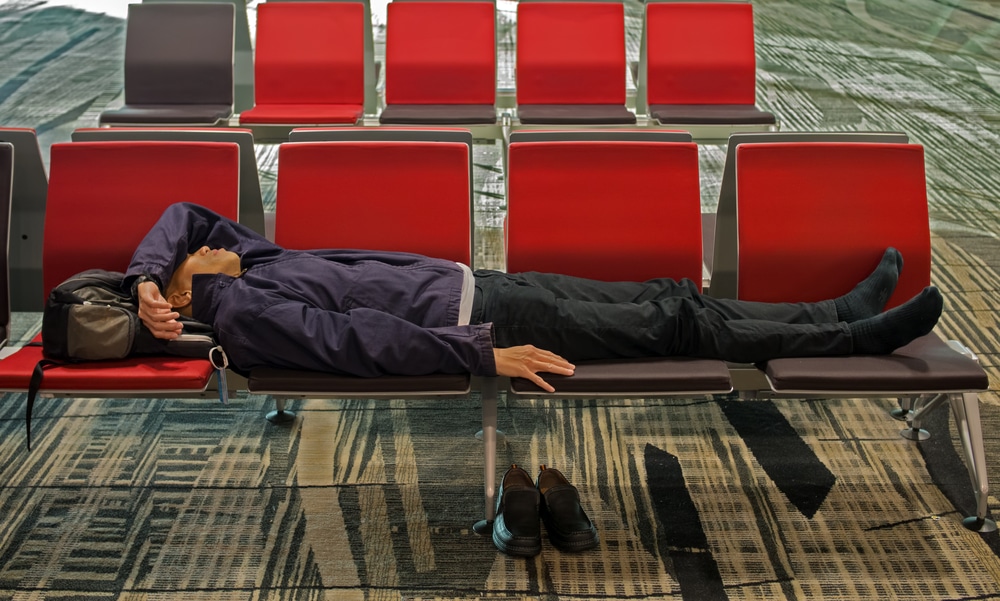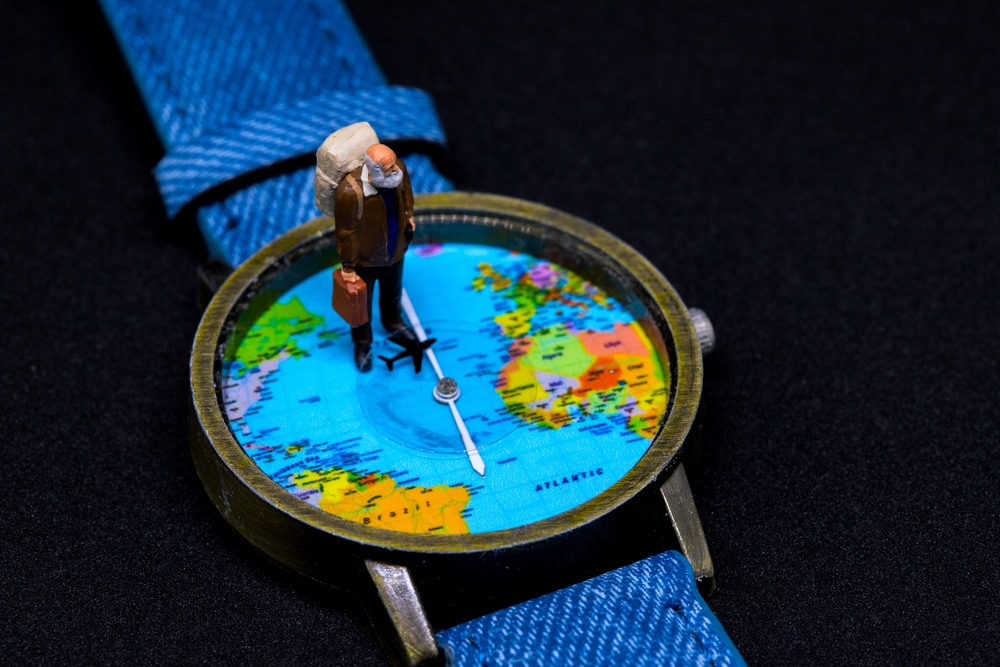Jet lag is a common phenomenon experienced by travelers who cross multiple time zones, resulting in disruptions to their sleep-wake cycle. It occurs when the body’s internal clock, or circadian rhythm, becomes misaligned with the new time zone. The effects of jet lag can range from mild fatigue and irritability to more severe symptoms such as insomnia and gastrointestinal disturbances. In order to mitigate the negative impacts of jet lag, it is important for travelers to adopt certain strategies before, during, and after their journey.
One effective approach to minimize jet lag is adjusting your sleep schedule before your trip. Gradually shifting your bedtime and wake-up time closer to those of your destination can help synchronize your body clock with the new time zone. Additionally, staying hydrated during your flight is crucial in combating jet lag as dehydration can exacerbate its symptoms. Drinking plenty of water throughout the journey helps maintain proper bodily functions and keeps you feeling refreshed upon arrival. By avoiding excessive caffeine and alcohol consumption during the flight, you can further prevent dehydration and promote better sleep quality.
Understanding Jet Lag and Its Effects on the Body
Jet lag can have significant effects on the body, disrupting its natural rhythms and causing a disorienting sensation akin to being caught in a perpetual state of twilight. One of the main effects of jet lag is the disruption of the body’s circadian rhythm, which is responsible for regulating various physiological processes such as sleep-wake cycles, hormone production, and body temperature. When traveling across multiple time zones, the body struggles to adjust to the new environmental cues and may experience symptoms such as fatigue, insomnia, irritability, and difficulty concentrating.
To minimize the effects of jet lag, there are several strategies that can be employed. Firstly, it is recommended to gradually adjust sleep schedules prior to travel by shifting bedtime and wake-up times closer to those at the destination. This gradual adjustment helps prepare the body for the upcoming change in time zone. Additionally, exposure to natural light or artificial bright light during waking hours can help regulate circadian rhythms and aid in adjusting to a new time zone more quickly. It is also important to stay hydrated during travel by drinking plenty of water and avoiding alcohol or caffeine which can disrupt sleep patterns. Lastly, some individuals find taking melatonin supplements helpful in promoting sleep when adjusting to a new time zone. However, it is always advisable to consult with a healthcare professional before using any medications or supplements for managing jet lag.
Understanding the effects of jet lag on circadian rhythm is crucial in developing effective strategies for minimizing its impact on the body. By implementing techniques such as gradually adjusting sleep schedules, exposure to light therapy, proper hydration, and considering melatonin supplementation under medical guidance, individuals can better manage jet lag symptoms and adapt more smoothly to different time zones.
Adjusting Your Sleep Schedule Before Your Trip

By gradually shifting your sleep schedule to align with the time zone of your destination prior to your trip, you can minimize the effects of circadian disruption and increase your chances of acclimating more easily. Adjusting your sleep schedule before your trip is an effective way to prepare your body for a new time zone and manage jet lag symptoms.
To effectively adjust your sleep schedule, it is recommended to start making changes a few days before departure. Gradually shift your bedtime and wake-up time earlier or later depending on the direction you are traveling. For example, if you are traveling eastward, try going to bed and waking up one hour earlier each day leading up to your trip. This helps your body gradually adapt to the new time zone and reduces the shock of sudden changes in sleep patterns.
In addition to adjusting sleep times, it is also important to expose yourself to natural light at appropriate times. Spending time outside during daylight hours can help regulate your internal clock and signal that it is daytime. Conversely, avoiding bright light exposure in the evening can signal that it is nighttime and help promote better sleep. By following these tips for managing jet lag symptoms and preparing your body for a new time zone through adjusting sleep schedules and light exposure, you can improve your chances of minimizing the effects of jet lag on your travel experience.
Staying Hydrated During Your Flight
Maintaining proper hydration levels throughout your flight is crucial for ensuring optimal comfort and well-being during travel. Staying hydrated not only helps to prevent jet lag but also combats the dry air inside the cabin, which can cause dehydration and discomfort. It is recommended to drink plenty of water before, during, and after your flight to keep your body hydrated. Avoid consuming excessive amounts of alcohol or caffeine as they can dehydrate you further.
In addition to drinking water, it is important to moisturize your skin during the flight. The dry air in the plane can strip moisture from your skin, leading to dryness and irritation. Applying a good quality moisturizer or hydrating face mist regularly throughout the flight can help retain moisture and keep your skin hydrated. Furthermore, it is advisable to avoid using harsh soaps or skincare products that may further dehydrate your skin.
To stay active during long flights and improve blood circulation, consider performing simple exercises while seated such as ankle rolls, wrist stretches, neck rotations, and shoulder shrugs. These movements help prevent muscle stiffness and reduce the risk of developing deep vein thrombosis (DVT). Additionally, taking short walks around the cabin whenever possible can be beneficial for both physical activity and stretching out cramped muscles. By following these tips for staying active and keeping yourself properly hydrated during the flight, you can minimize discomfort associated with long-haul travel and increase your chances of avoiding jet lag upon arrival at your destination.
Avoiding Excessive Caffeine and Alcohol
To minimize the risk of dehydration during a flight, it is advisable to limit the consumption of caffeine and alcohol. Both caffeine and alcohol have diuretic properties, which can increase fluid loss from the body and contribute to dehydration. Caffeine withdrawal may also occur when individuals who are regular coffee or tea drinkers refrain from consuming these beverages during their flight. This can lead to symptoms such as headaches, irritability, and fatigue. Therefore, it is recommended to gradually reduce caffeine intake in the days leading up to the flight to minimize the impact of withdrawal symptoms.
Alcohol consumption should also be avoided or limited during flights as it can exacerbate dehydration. Alcohol acts as a diuretic by increasing urine production, which can result in increased fluid loss from the body. Additionally, alcohol can impair judgment and decision-making abilities, potentially compromising one’s ability to stay adequately hydrated during a long-haul flight. It is important to note that both caffeine and alcohol should be consumed in moderation if desired before or during a flight, with an emphasis on staying well-hydrated by drinking plenty of water throughout the journey.
Getting Natural Sunlight and Exercise
Exposing oneself to natural sunlight and engaging in physical activity can offer potential benefits during a flight, enhancing overall well-being and potentially mitigating certain physiological effects associated with air travel. Natural sunlight is a valuable source of vitamin D, which plays a crucial role in various bodily functions such as bone health and immune system regulation. By getting natural sunlight before or during a flight, individuals can ensure adequate levels of vitamin D, which may help support their immune system and reduce the risk of illness while traveling. Moreover, exposure to natural light has been linked to improved mood and increased alertness, both of which are important for combating jet lag.
Similarly, incorporating exercise into one’s pre-flight routine or engaging in physical activity during layovers can have positive effects on the body. Exercise promotes blood circulation and helps prevent blood clots that may form during long periods of immobility on flights. Moving around and stretching regularly can also alleviate muscle stiffness and discomfort caused by sitting for extended periods. Additionally, exercise releases endorphins – chemicals known for their mood-enhancing properties – which can counteract feelings of fatigue or lethargy often experienced after long flights. By taking advantage of opportunities for exercise before or during air travel, individuals can not only promote physical well-being but also enhance their mental state, making it easier to adjust to new time zones and minimize the impact of jet lag.
Exposing oneself to natural sunlight and engaging in physical activity before or during air travel offers several benefits that contribute to overall well-being. These practices provide essential vitamin D levels necessary for optimal functioning of the body’s systems while reducing the risk of illness. Exercise further enhances blood circulation, reduces muscle discomfort associated with prolonged sitting, and boosts mood through the release of endorphins. By incorporating these strategies into their travel routine, individuals can mitigate some physiological effects associated with air travel and improve their ability to adapt to different time zones effectively.
Using Sleep Aids and Melatonin Supplements
Using sleep aids and melatonin supplements can be an effective strategy to regulate sleep patterns and promote better rest during air travel. Sleep aids are medications that help induce sleep or improve the quality of sleep, while melatonin is a hormone naturally produced by the body to regulate sleep-wake cycles. By taking sleep aids or melatonin supplements, individuals can potentially minimize the disruptions caused by jet lag and adjust their internal clock to the new time zone.
However, it is important to note that there are alternative methods for managing jet lag without relying solely on supplements. For instance, practicing good sleep hygiene can significantly contribute to reducing the effects of jet lag. This includes maintaining a regular sleep schedule, avoiding stimulants like caffeine before bedtime, and creating a comfortable sleeping environment. Additionally, engaging in light exercise and exposure to natural sunlight can also help regulate circadian rhythms and promote better sleep during air travel. These alternatives should be considered alongside or as complements to using sleep aids or melatonin supplements in order to effectively combat jet lag without solely relying on medication.
Eating Light and Healthy Meals
Using Sleep Aids and Melatonin Supplements can be an effective strategy for mitigating the symptoms of jet lag. However, there are other methods that can also contribute to a smoother adjustment to a new time zone. One such method is adopting a light and healthy eating routine during travel. By consuming nutritious meals that are easy on the digestive system, travelers can optimize their energy levels while minimizing discomfort.
When it comes to combating jet lag through diet, opting for light snack options can be particularly beneficial. Instead of indulging in heavy and greasy meals, choosing foods that are easily digestible can help prevent feelings of bloating or sluggishness. Examples of suitable snacks include fresh fruits, yogurt, nuts, and whole grain crackers. These snacks provide essential nutrients without burdening the body with excessive calories or unhealthy fats.
Another dietary approach that has gained popularity in recent years is intermittent fasting. This eating pattern involves cycling between periods of eating and fasting, typically within a window of 8-10 hours each day. The benefits of intermittent fasting extend beyond weight management; it has been suggested that this practice may improve circadian rhythms and enhance sleep quality as well. By restricting food intake during certain hours, individuals may align their meal times more closely with the local time at their destination, aiding in the adjustment process.
Incorporating light snack options into one’s travel diet and considering intermittent fasting as an eating strategy may offer additional ways to combat jet lag beyond relying solely on sleep aids or melatonin supplements. These approaches allow travelers to maintain proper nutrition while minimizing digestive discomfort and optimizing circadian rhythms for better sleep quality upon arrival at their destination.
Avoiding Heavy Meals Before Bed
To optimize sleep quality and minimize potential digestive discomfort, it is advisable to consume lighter meals in the hours leading up to bedtime. Avoiding heavy meals before bed is crucial as it allows the body to focus on rest and recovery rather than digestion. When we eat a large, heavy meal close to bedtime, our bodies need more energy to break down the food, which can interfere with falling asleep and result in poor sleep quality.
Late night snacking, especially on heavy foods high in fat and protein, can have several negative effects on sleep. These types of foods take longer to digest and can cause indigestion or heartburn, making it difficult for individuals to fall asleep or stay asleep during the night. Additionally, consuming heavy meals before bed can lead to weight gain as the body may not have enough time to burn off the excess calories before going into a period of rest. This disruption in the body’s natural circadian rhythm can also affect hormone regulation and metabolism.
Avoiding heavy meals before bed is essential for optimizing sleep quality and minimizing potential digestive discomfort. By consuming lighter meals in the hours leading up to bedtime, individuals can ensure that their bodies are able to focus on rest and recovery rather than digestion. This simple adjustment in eating habits can greatly improve overall sleep health and contribute to better physical well-being.
Creating a Comfortable Sleep Environment
Transition: In order to further mitigate the effects of jet lag, it is important to consider not only what you eat before bed but also the sleep environment you create. By focusing on creating a calming atmosphere and minimizing noise distractions, travelers can optimize their chances of achieving restful sleep and reducing the impact of jet lag.
Creating a comfortable sleep environment is essential for combating jet lag. One way to achieve this is by ensuring that the sleeping area is quiet and free from excessive noise distractions. This can be achieved by using earplugs or investing in a white noise machine that generates soothing sounds, effectively drowning out any disruptive noises. Additionally, it may be beneficial to choose accommodations away from high-traffic areas or sources of loud noise, such as elevators or construction sites.
Furthermore, creating a calming atmosphere in the sleep environment can greatly enhance one’s ability to fall asleep and stay asleep during travel. This can involve adjusting the lighting in the room to promote relaxation by dimming overhead lights and using bedside lamps with warm, soft light instead. It may also be helpful to use blackout curtains or an eye mask to block out any unwanted sunlight or artificial light sources that could interfere with sleep quality. By taking these steps to create a tranquil ambiance conducive to restful sleep, individuals can better manage their circadian rhythms and minimize the disruption caused by jet lag.
Establishing a Routine in the New Time Zone

Establishing a consistent daily routine in the new time zone can help travelers adjust to their surroundings and minimize the disruptive effects of changing time zones. One important aspect of establishing a routine is adjusting to local meal times. Eating meals at regular intervals according to the local time can help reset the body’s internal clock and promote better adaptation to the new time zone. It is recommended for travelers to gradually shift their meal times before departing, so that they are closer aligned with those in their destination. This can be achieved by slowly adjusting meal times by an hour or so each day leading up to the trip.
Once in the new time zone, it is crucial to adhere to local meal times as much as possible. This means having breakfast, lunch, and dinner at appropriate hours based on the local culture and customs. Following this routine not only helps regulate hunger levels but also supports synchronization with daylight exposure, which plays a significant role in resetting the body’s circadian rhythm. Additionally, it is advisable for travelers to avoid heavy meals close to bedtime as it may disrupt sleep patterns and hinder adjustment efforts.
By establishing a routine in the new time zone and adjusting meal times accordingly, travelers can assist their bodies in adapting more smoothly to changes in time zones. Consistency is key when it comes to resetting one’s internal clock, and adhering to local schedules for meals helps promote synchronization with daylight exposure and supports better sleep patterns.
Conclusion
In conclusion, jet lag is a common phenomenon that can have significant effects on the body. It occurs when traveling across multiple time zones, disrupting the body’s internal clock and causing symptoms such as fatigue, insomnia, and digestive issues. However, there are several strategies that can help minimize the impact of jet lag.
Adjusting your sleep schedule before your trip can help your body acclimate to the new time zone more smoothly. Staying hydrated during your flight is also crucial in combating jet lag, as dehydration can exacerbate its symptoms. Avoiding excessive caffeine and alcohol is another important step to take, as these substances can disrupt sleep patterns and worsen jet lag.
Getting natural sunlight and exercise upon arrival at your destination can help reset your body’s internal clock. Similarly, eating light and healthy meals can aid in digestion and promote better sleep quality. It is also advisable to avoid heavy meals right before bed to prevent discomfort during sleep.
Creating a comfortable sleep environment by using earplugs or an eye mask can contribute to better quality rest while adjusting to a new time zone. Finally, establishing a routine in the new time zone by following regular mealtimes and bedtimes helps signal to your body when it should be awake or asleep.
By implementing these strategies, individuals can significantly reduce the impact of jet lag on their bodies and enjoy a more seamless transition when traveling across different time zones. Understanding how jet lag affects our bodies allows us to take proactive steps to mitigate its negative effects and optimize our travel experiences.


